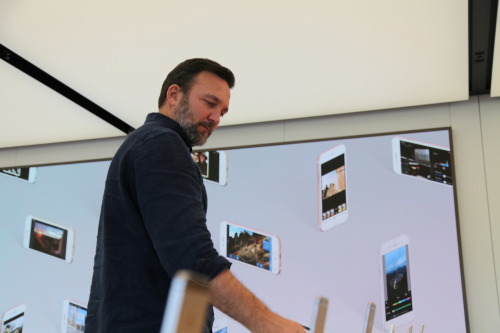
Crypto Wars, an upcoming Faultlines documentary on Al Jazeera explores this year’s Apple vs FBI encryption war
For Immediate Use
In Crypto Wars, Faultlines documentary on Al Jazeera, Josh Rushing explores this year’s Apple vs FBI encryption war and why encryption is one of the burning issues of our time.
When Apple refused the FBI’s request to build software to help unlock an iPhone used by Syed Farook, one of the San Bernardino shooters, the U.S. Department of Justice took the company to court.
Apple pushed back, with an open letter to their customers. To the FBI’s critics, the case against Apple looked like an attempt to set a legal precedent forcing a company to undermine its own encryption.
The FBI dropped the case at the end of March 2016, announcing that they’d paid an unnamed entity to hack the phone. In Crypto Wars, San Bernardino police chief Jarrod Burguan admits that “there was no smoking gun” when the FBI finally accessed the phone.
The bureau claims this situation is just one example of a larger problem, known as going dark. “A whole series of technological changes are creating a situation where, for example, when we have a search warrant, authorized by a judge, we simply cannot get the evidence, in this case digital evidence, that we need,” says Sasha O’Connell, the FBI’s chief policy advisor for science and technology.
But Morgan Marquis-Boire, head of security for First Look Media and a researcher at The Citizen Lab, questions this. “We’re living in the golden age of surveillance, because everyone generates so much data these days. We carry around devices which constantly beacon our location. I’m constantly sending messages about what I’m thinking and doing. So the vast volumes of data that are generated and collected don’t suggest a going dark problem at all.”
Attorney Cindy Cohn, executive director of the Electronic Frontier Foundation, adds that the FBI actually had a lot of information from Farook’s phone. “Apple helped a lot,” she says. “Apple gave them access to all of the information they had, which included all the metadata, so they knew everybody who got called from this phone, everybody who called into this phone.” She says it was a Verizon phone, so the FBI could also have accessed the calling data from Verizon.
“The FBI was trying to frame it like they’re losing access to everything, that they have no visibility into what’s happening anymore,” says Moxie Marlinspike, one of the developers of the Signal protocol and the force behind the Signal app, which encrypts messages end-to-end by default. The protocol is being used by over a billion people and has been integrated with the likes of Whatsapp and Facebook Messenger. “The truth is that in that situation, they had a lot of visibility and a lot of access…”
As Apple vs FBI wound down, US senators Dianne Feinstein and Richard Burr released draft legislation that would allow federal judges to force US companies to hand over their clients’ plain text data to law enforcement, effectively banning strong end-to-end encryption.
But the bill hasn’t been introduced and the US government is divided. “One of the senators said that encryption is the Achilles’ heel of internet. I think the exact opposite,” says congressman Ted Lieu, one of only four computer science majors elected to congress. “My view is that encryption is the armour of the internet. You can’t have the internet operate without encryption and U.S. national security depends on encryption. We want to strengthen encryption; we do not want to weaken it.”
Lieu argues that compelled decryption would create vulnerabilities for foreign companies to exploit. “Let’s say congress passes a law mandating back doors. Well, you know, it wouldn’t apply to a Samsung. So not even a very smart terrorist can go, okay, well, I’ll stop buying my Apple and I’ll just go buy a phone from another country and start using that.”
In Crypto Wars, Rushing also sets out to find out if a hacker – or the FBI – can access his messages, even when they are encrypted on his iPhone.
Marquis-Boire calls the iPhone’s encryption “robust” and says it’s “rarely the most obvious place to attack from a security perspective.” He says iPhones are hackable, but adds, “I’d probably have to get really inventive… Current prices floating around for a full chain iPhone exploit are upwards of a million U.S. dollars.”
Watch Crypto Wars on Faultlines on www.aljazeera.com/programmes/faultlines from 2230 GMT 25 October 2016
Image above: Josh Rushing, photo credit Joel Van Haren
About Fault Lines
We live in a world run through with fault lines. Al Jazeera's Fault Lines takes you beyond the headlines, holding the powerful to account across the U.S. and the Americas. The acclaimed series has won Emmy, International Emmy, and Peabody Awards
@AJFaultLines on Twitter











